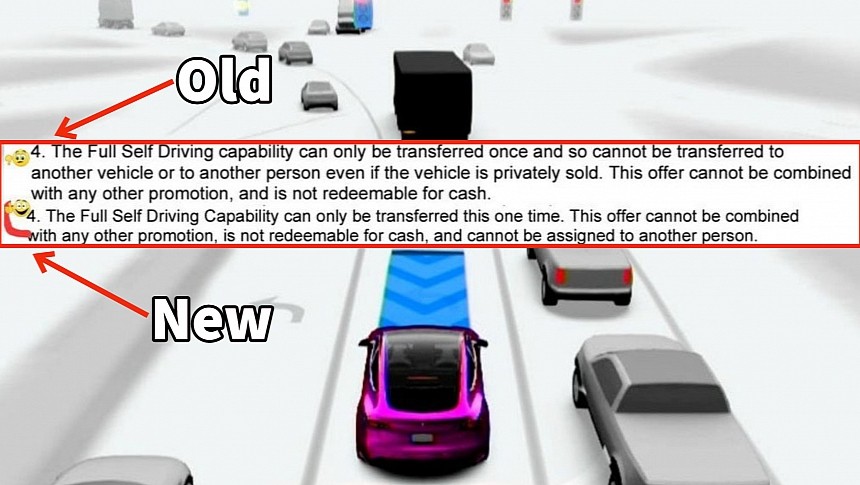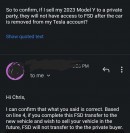Tesla changed the FSD transfer contract to make it less clear about what happens to FSD when the car is sold privately. In the original form, Tesla said that privately selling the new vehicle would deactivate FSD. Those who signed the original contract received updated documents from Tesla without the controversial stipulation.
For years, Tesla owners asked Tesla to tie FSD to the person buying it instead of the car. This would allow the transfer of the license to a new vehicle when replacing the old car. Still, Tesla refused to allow it, so people had few reasons to upgrade their old vehicles. Not only that, but they feared that destroying their cars would also terminate FSD, which for some was a hefty $15,000 purchase. Tesla promised FSD is an appreciating asset, paying for itself once full self-driving is achieved. However, this is an uninsurable investment that can go up in smoke anytime.
After many discussions on the subject, Tesla reluctantly announced it would allow FSD transfer to a vehicle for a limited period and under certain conditions. The most important would be that people must take delivery of a new Tesla by the end of September to qualify for the one-time free transfer. The transfer contracts also specified that the FSD on the new car would be deactivated when sold, which caused people to voice their disappointment on social media.
Traditionally, although the FSD Capability could not be transferred to a new vehicle, it stayed with the car when it was sold privately to a new owner. This was the cheapest way to access FSD, as the price was far less than what Tesla asked when ordering a new vehicle. Being unable to sell the car with FSD was a boomer, and many canceled their orders for a new vehicle when the contracts arrived.
Thankfully, it appears that Tesla changed the contract terms after receiving feedback from its user base. The infamous point 4 in the contract stated that FSD "can only be transferred once and so cannot be transferred to another vehicle or to another person even if the vehicle is privately sold." People asking for clarifications from Tesla sales advisors were told the FSD would not transfer to the private buyer if they wished to sell the new vehicle in the future. As you'd expect, this caused an uproar among Tesla owners.
On Sunday, the EV maker sent new contracts to people who had already signed, and point 4 has been modified. "The Full Self Driving Capability can only be transferred this one time," reads the first sentence. The second sentence has been updated with "and cannot be assigned to another person," although this refers to the transfer offer, not the FSD itself.
Although this one-time transfer would allow Tesla owners to finally upgrade their vehicles, it doesn't solve the underlying problem. As someone pointed out, you could transfer your FSD now to a new Tesla, but if a tree falls on it on October 1, tough luck, it's gone, and you have to pay again. That's why a subscription is a better solution, especially as the $15,000 upfront price equals 75 months of FSD or more than six years. This is more than most people keep their cars and offers the flexibility to cancel anytime.
After many discussions on the subject, Tesla reluctantly announced it would allow FSD transfer to a vehicle for a limited period and under certain conditions. The most important would be that people must take delivery of a new Tesla by the end of September to qualify for the one-time free transfer. The transfer contracts also specified that the FSD on the new car would be deactivated when sold, which caused people to voice their disappointment on social media.
Traditionally, although the FSD Capability could not be transferred to a new vehicle, it stayed with the car when it was sold privately to a new owner. This was the cheapest way to access FSD, as the price was far less than what Tesla asked when ordering a new vehicle. Being unable to sell the car with FSD was a boomer, and many canceled their orders for a new vehicle when the contracts arrived.
Thankfully, it appears that Tesla changed the contract terms after receiving feedback from its user base. The infamous point 4 in the contract stated that FSD "can only be transferred once and so cannot be transferred to another vehicle or to another person even if the vehicle is privately sold." People asking for clarifications from Tesla sales advisors were told the FSD would not transfer to the private buyer if they wished to sell the new vehicle in the future. As you'd expect, this caused an uproar among Tesla owners.
On Sunday, the EV maker sent new contracts to people who had already signed, and point 4 has been modified. "The Full Self Driving Capability can only be transferred this one time," reads the first sentence. The second sentence has been updated with "and cannot be assigned to another person," although this refers to the transfer offer, not the FSD itself.
Although this one-time transfer would allow Tesla owners to finally upgrade their vehicles, it doesn't solve the underlying problem. As someone pointed out, you could transfer your FSD now to a new Tesla, but if a tree falls on it on October 1, tough luck, it's gone, and you have to pay again. That's why a subscription is a better solution, especially as the $15,000 upfront price equals 75 months of FSD or more than six years. This is more than most people keep their cars and offers the flexibility to cancel anytime.
Hey everyone, some good news. I was sent a new FSD transfer to sign, 4 has been changed, and I was told FSD will stay with the new car in the event of private sale. Thanks for everyone asking your SA/DA.
— Dirty Tesla (@DirtyTesLa) July 22, 2023
I'll say I'm still not a fan of #8, if anyone at Tesla saw these tweets :) https://t.co/wcZfADoAJd pic.twitter.com/aWFKtAhPkA





